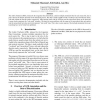Free Online Productivity Tools
i2Speak
i2Symbol
i2OCR
iTex2Img
iWeb2Print
iWeb2Shot
i2Type
iPdf2Split
iPdf2Merge
i2Bopomofo
i2Arabic
i2Style
i2Image
i2PDF
iLatex2Rtf
Sci2ools
68
Voted
LREC
2008
2008
Diacritic Annotation in the Arabic Treebank and its Impact on Parser Evaluation
The Arabic Treebank (ATB), released by the Linguistic Data Consortium, contains multiple annotation files for each source file, due in part to the role of diacritic inclusion in the annotation process. The data is made available in both "vocalized" and "unvocalized" forms, with and without the diacritic marks, respectively. Much parsing work with the ATB has used the unvocalized form, on the basis that it more closely represents the "real-world" situation. We point out some problems with this usage of the unvocalized data and explain why the unvocalized form does not in fact represent "real-world" data. This is due to some aspects of the treebank annotation that to our knowledge have never before been published.
| Added | 29 Oct 2010 |
| Updated | 29 Oct 2010 |
| Type | Conference |
| Year | 2008 |
| Where | LREC |
| Authors | Mohamed Maamouri, Seth Kulick, Ann Bies |
Comments (0)

